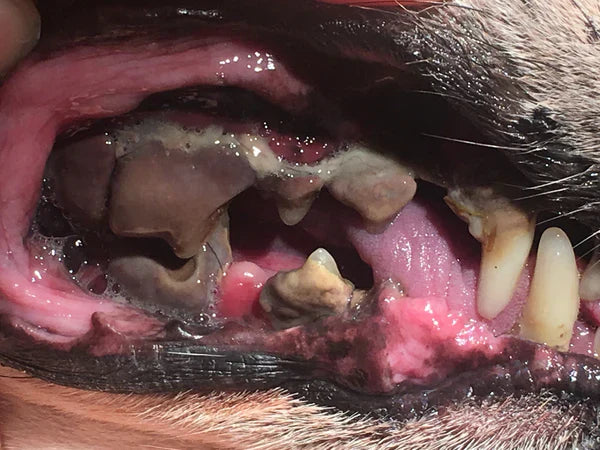Many people believe that feeding dry food will keep their pet's teeth clean and healthy. This statement is fiction and not fact. Many studies have been performed that bust this myth, even though it is perpetuated by veterinarians and pet food companies. Kibble may, in fact, contribute to dental disease in dogs and cats.
Does a kibble diet help remove plaque from a cat’s or dog’s teeth?
In 1996, a large study looked at 1,350 client-owned dogs in North America. The study found no difference in levels of dental disease between kibble-fed dogs and dogs fed food that was something other than dry food. In 2007, a study was conducted to determine if a larger size of kibble (with a large air-filled matrix) would help reduce plaque and tartar. Unfortunately, dogs and cats often do not chew their kibble, even if the pieces are larger and filled with air. The study concluded that the kibble did not result in enough abrasive action on the teeth to significantly reduce plaque and tartar. Furthermore, the kibble used in the study was a prescription diet which is not meant to be a base diet for a dog or cat.
How does a kibble diet contribute to dental disease?
Kibble can contribute to dental disease in that it is ultra-processed at high heats. High heat processing has been shown to increase inflammation and periodontal disease in the body. Kibble contains starches and fillers that break down into sugar, contributing to plaque and bad bacteria build up. A study in Australia showed that dental health declined in just 17 days after switching from a raw to a kibble diet in dogs. Another study showed higher dental disease in cats fed a dry food diet versus feral cats eating a (raw) diet in the wild.
How does fresh food help maintain good dental health?
- Fresh food does not contain additives (sugar), or simple carbohydrates (potatoes and rice) which break down into sugar. Sugar causes increased plaque and feeds the bad oral bacteria. Plaque leads to tartar, gingivitis, and periodontal disease. One study showed that dental health declined within just 17 days of switching from a raw to a kibble diet in dogs. Another study showed dental calculus was significantly higher in cats fed commercial diets versus feral cats eating wild prey.
- Raw meat contains enzymes that break down food material. Raw meaty bones act as the abrasive to keep the tartar off your dog’s teeth. Pets fed raw diets or home cooked diets supplemented with raw meaty bones will have significantly less tartar. Never feed cooked bones, as these are brittle and can splinter, causing broken teeth and bowel perforations.
- Fresh food will benefit the microbiome in both the mouth and the bowel. Kibble contributes to a microbiome that promotes inflammation.
- Fermented foods or adding prebiotics and probiotics will promote good oral health by replacing bad bacteria with good bacteria in the microbiome. In studies, oral probiotics applied directly to the mouth are shown to decrease bacteria that promote dental disease and can also help increase bone density. Rubbing a probiotic directly on the gums is a great way to change the oral microbiome.
- Foods high in antioxidants such as CoQ10 can help support periodontal disease. Fresh meats (including organ meats), fish and eggs are abundant in CoQ10. As your pet gets older, they are less able to create their own CoQ10 and supplementation may be needed.
- Foods high in Fatty Acids such as Omega-3 fatty acids are also an excellent way to promote good dental health. The ideal ratio of Omega-6 to Omega 3 levels should be no higher than three to one. Fresh foods like fish, egg yolks, fish and algae oils, free range or grass-fed meats are great additions to the diet.
The gold standard for good oral health in dogs and cats is daily brushing. A combination of my oral dental drops with coconut oil, or a probiotic such as Love Bugs mixed with coconut oil are great options to support your pet's daily dental care routine. For more information on the link between diet and dental health, check out these blogs:
https://drjudymorgan.com/blogs/blog/kick-kibble-to-the-curb-dental-myths?_pos=1&_sid=1eb4b45df&_ss=r
Check out Dr. Judy's Dental Health Resources
Disclaimer: This content is for informational purposes only and is not meant to diagnose, treat, or replace consulting a primary veterinarian for individualized care.

